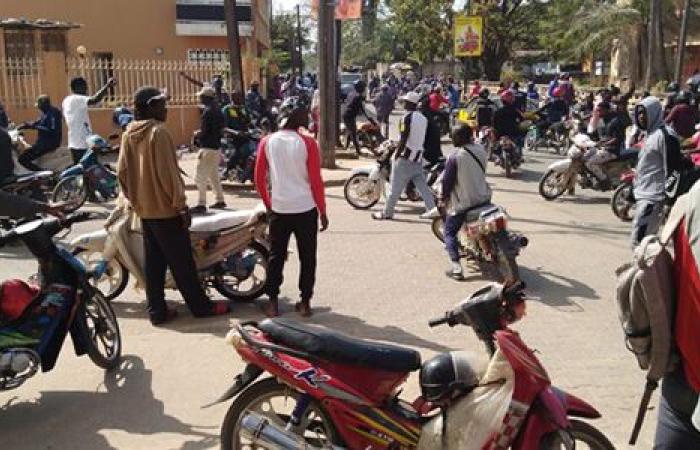
The transport sector in Senegal, particularly that of motorcycles, has grown exponentially in recent years, especially in cities like Dakar, Kaolack and other urban centers. If motorcycles offer a quick and economical solution to mobility challenges, they are also at the heart of many challenges in terms of road safety, transport organization and market regulation. The government of Senegal, in the interests of rationalization and security, has implemented a new measure aimed at registering motorcycles and obtaining a driving license for drivers. However, this decision arouses strong opposition among drivers who consider it costly and poorly explained.
Motorcycles appeared in the Senegalese urban landscape in the 1990s, but their use for transporting people and goods has really exploded over the last two decades. Originally, they were mainly used by individuals as a means of individual transport. However, from the 2000s, a new phenomenon was born: Motorcycle taxis. These motorcycles, mainly used for passenger transport, have become a popular alternative to traditional taxis, particularly in cities like Dakar and Kaolack where traffic is often congested.
In Kaolack, a town in the center of the country, motorcycles also met a vital need: that of facilitating travel in a rapidly developing city and in rural areas often poorly served by other means of transport. In this region, motorcycles were quickly adopted for the delivery of goods, giving rise to another, more informal but equally efficient model of transport known as “tiak tiak”. These motorcycles have become the mainstays of a booming industry, where drivers transport goods and packages for individuals or local businesses.
Despite the undeniable benefits of this reform, the introduction of compulsory registration of motorcycles and the obligation for drivers to obtain a driving license has encountered strong resistance from stakeholders in the sector. Several reasons explain this discontent:
The high cost: The main complaint from drivers concerns the cost of registration, estimated at 28,000 CFA francs. For many drivers, particularly those on “tiak tiak”, who have modest incomes, this amount represents a significant burden, especially since other costs (driving license, insurance, motorcycle maintenance) come into play. add. They believe that this regulation should be free or, at the very least, less expensive.
Lack of communication and awareness: Many drivers do not perceive the immediate usefulness of registration and driving license. They are not informed of the long-term benefits of this measure, such as better road safety, the possibility of combating theft or even the legal legitimacy of motorcycle drivers in their professional activities.
-Poor preparation of the sector: The government did not sufficiently consult sector stakeholders, which led to a lack of dialogue. It is essential to recognize that transport motorcycles are not all used in the same way, which requires differentiating measures according to types of use.
In order to overcome these obstacles and have the measure accepted, here are some recommendations that could be put in place by the government of Senegal:
1. List the three types of motorcycles:
As there are, depending on usage, three types of motorcycles in Senegal: those used by individuals, those used for passenger transport and those dedicated to delivery (tiak tiak), it would be relevant to identify them distinctly.
One solution could be to dedicate a color to each type of motorcycle depending on its use, as is already the case for taxis (yellow and black) and private cars. This visual identification would make it possible to easily distinguish motorcycles and ensure better control by the authorities.
2. Issue operating licenses:
Motorcycles intended for passenger transport or delivery should benefit from a specific operating license. This would make it possible to better regulate these activities while allowing drivers to work within a legal framework. Licenses could be subject to insurance conditions and motorcycle safety, while offering preferential rates for professionals.
3. Facilitate administrative procedures and reduce costs:
The cost of registration could be revised and a staggered or subsidized payment could be put in place, particularly for low-income drivers. Furthermore, simplifying administrative procedures and organizing mobile counters in rural or remote areas would be a way of making registration more accessible.
Beyond that, a targeted communication strategy is crucial to facilitate the adoption of the measure.
Organize awareness campaigns through the media, particularly radio and television, to explain the advantages of registration: rapid identification in the event of theft, better accident control, increased road safety. These campaigns should be adapted to each type of audience, highlighting the specific benefits for transport and delivery drivers.
Engage with industry stakeholders: Create spaces for dialogue between government and motorcycle drivers, as well as professional organizations, to discuss concerns and practical solutions. A participatory approach would strengthen the legitimacy of the measure and ease tensions.
Local communication: Set up local agents who will go directly to neighborhoods, motorcycle garages and rural areas to explain the registration procedure and the advantages linked to the regulation. This direct contact will help clear up misunderstandings and address drivers’ concerns.
Offer reductions or benefits for drivers who register their motorcycle within a given time frame, such as reduced insurance rates or safety bonuses (reduction in fines or assistance with the purchase of safety equipment).
We all agree that registering motorcycles and obtaining a driving license for drivers are important steps for modernizing and securing the transport sector in Senegal. However, the success of this reform largely depends on the government’s ability to establish a dialogue with drivers and adapt the measure to the reality on the ground. Transparent communication and supporting measures such as the differentiation of motorcycles by their use, reduction of costs and incentives for registration, will be essential to pass this reform and guarantee its success.
Souleymane LY
Communications specialist
[email protected]





